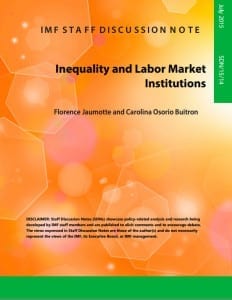 The notion that unionization and higher wages decrease income inequality is a fundamental premise of the Solidarity Center and our allies. But now a surprising source has reached the same conclusion: the International Monetary Fund (IMF).
The notion that unionization and higher wages decrease income inequality is a fundamental premise of the Solidarity Center and our allies. But now a surprising source has reached the same conclusion: the International Monetary Fund (IMF).
“The decline in unionization is related to the rise of top income shares and less redistribution, while the erosion of minimum wages is correlated with considerable increases in overall inequality,” the IMF concludes in a newly released “staff discussion note.”
According to Inequality and Labor Market Institutions, a steep decline in union density is followed by a 1.8 percent increase of top incomes and a 3 percent decline for workers’ share over the ensuing five years. Further, “if de-unionization weakens earnings for middle- and low-income workers, this necessarily increases the income share of corporate managers and shareholders.” The study examined 20 advanced economies between 1980 and 2010.
Declining union strength “appears to be associated with less income redistribution, likely through a reduced influence of unions on public policy,” says Florence Jaumotte, an economist and co-author of the publication. Not to mention another fact: unions help raise wages, both for members and the community at large.
Long a bastion of pro-employer policies, the IMF is not willing to go so far as to recommend the obvious. Acknowledging its findings can “suggest that higher unionization and minimum wages can help reduce inequality,” the IMF dodges the logical conclusion to pursue such policies, saying its data “do not constitute a blanket recommendation for more unionization or higher minimum wages.”
The IMF study notes that such decisions should be made on a country by country basis—leaving the reader to presume that countries supporting shared prosperity among all citizens will enable their workers to form unions, and ensure a living wage for all.

